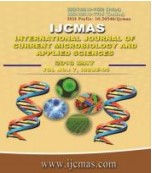


 National Academy of Agricultural Sciences (NAAS)
National Academy of Agricultural Sciences (NAAS)

|
PRINT ISSN : 2319-7692
Online ISSN : 2319-7706 Issues : 12 per year Publisher : Excellent Publishers Email : editorijcmas@gmail.com / submit@ijcmas.com Editor-in-chief: Dr.M.Prakash Index Copernicus ICV 2018: 95.39 NAAS RATING 2020: 5.38 |
Consumption of tender coconut is increasing day by day. Due to heavy consumption of these tender nuts in urbans, the disposal also indirectly affects public health. Biodegradation of tender coconut took more than two years under natural condition. Hence, a study was taken on “Conversion of tender coconut waste into high quality organic manure using microorganism and earthworms”. The tender coconut waste was pretreated with lime, rock phosphate, cowdung and glyricidia and treatment was imposed viz., T1-TCW+earthworm (Eudrilus eugeniae), T2-TCW + Trichoderma viridae + Pleurotus sajorcaju, T3-TCWonly (without earthworms/microorganism), T4-RTCW (Raw tender coconut waste). The results of the experiment revealed that vermicomposting of tender coconut waste with Eudrilus eugeniae significantly reduces the time of composting (60 days) with highest compost recovery (680kg/one tonne) compared to microbial compost (90 days) with compost recovery of 490kgs/one tonne of the substrate. Vermicomposting of tender coconut waste resulted in increase of pH, decrease of electrical conductivity (dms 1), cellulose (%), lignin (%) and significantly narrow down the carbon nitrogen ratio. The raw tender coconut contains nitrogen (0.53%), phosphorus (0.10%) and potash (2.23%), on composting, there was increase of 1.55% (N), 0.23% (P) and 2.24% (K) in vermicompost whereas in microbial compost 0.90% (N), 1.11% (P) and decrease in K by 0.95%. The vermicompost was also rich in micronutrients viz., manganese (164ppm), Iron (8381 ppm), Zinc (134.60 ppm), copper (38.33 ppm). A total microbial load (cfu’s) was observed high in vermicompost (486.61 cfu/g) compared to microbial compost (391.14 cfu/g).
 |
 |
 |
 |
 |